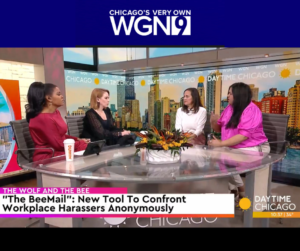12 Ways to Protect Yourself When Dating in the Workplace

Everyone has an opinion about dating in the workplace. Most people will tell you DON’T DO IT! But when you meet someone and things click, all the advice and opinions tend to go out the window. Many people who decide to date their co-workers will go on to have long-term relationships. But for every successful relationship that starts at work, many fail. And some crash and burn, negatively impacting both dating partners’ careers in the process.
Take These Steps to Protect Yourself
We are not going to tell you what to do in your relationship. But we want you to be aware of the risks (see our blog post: Seven Risks To Be Aware Of When Dating In The Workplace), and be armed with ways to protect yourself from a career crash and burn.
Here are 12 Ways to Protect Yourself When Dating in the Workplace – for best-case (long term relationship) and worst-case (break up) scenarios.
1.
Check your work policy on dating in the workplace
Some companies have a policy regarding workplace romances. Your company has this policy in place to protect the company from liability and harassment complaints.
- Check your employee handbook to review the policy on dating in the workplace.
2.
ASSESS your ability to remain professional
- Are you both mature enough to behave professionally regardless of what is happening in your personal lives?
- Are you both able to separate work problems and goals from personal problems and goals?
- Are you both willing and able to find new opportunities outside the company, if required?
3.
THINK OF OTHERS that may be affected
Who is affected by your decision to date someone in the office?
- Who you choose to date may not be anyone’s business, but your actions, behaviors, and choices will affect other people who work with you.
- Who at work comes into contact with both you and your romantic partner? To what extent will they be affected? (These could be team members, bosses, subordinates, clients, vendors, etc.)
4.
VISUALIZE possible outcomes
- If you break up, how will you feel when you are at work the next day? How will you cope with those feelings? What will it feel like after one week, a month, or longer? Think about all the places where you come into contact with one another.
- If you break up and the other person starts dating someone else in the office, how will you feel, and how will you react?
- If you get serious (move in together, get married, have kids, etc) and then break up, what are the impacts on your workday and your career options?
5.
CREATE A DISCLOSURE PLAN with your romantic partner
When and how will you disclose your relationship?
- After reviewing your company policy, make a plan for disclosure to HR.
- In the interest of transparency, consider letting your boss, subordinates, and other co-workers know you are dating, but only if you feel safe in doing so. Determine if, how, and when you will make your relationship public. You can prepare a statement. Don’t get defensive if someone disapproves – you don’t need to explain or defend your decision to date someone at work just because you have chosen to be transparent.
- Determine what conversations, topics, and behaviors are off-limits both among yourselves and with co-workers, while at work.
6.
AGREE TO BREAK UP TERMS ahead of time
- This could include a behavior plan based on mutual respect (no arguments, badmouthing, talking about the breakup with other colleagues, etc.), transfers to other departments, resignation, etc.
7.
DISCLOSE your romantic relationship to HR if company policy requires you to do so
You may be reported to your HR department for inappropriate behavior if you do not adhere to policy requirements.
- Document when and to whom you disclose.
- If you and your romantic partner have agreed to disclose to your boss, subordinates and/or other co-workers, implement your disclosure plan.
- Document any repercussions from disclosing your relationship.
8.
BE DISCREET
- Behave professionally while at work and work functions.
- Don’t discuss the details of your relationship with work friends or co-workers.
- Do not engage in physical or verbal affection at work.
9.
CONSIDER FINDING A NEW JOB
- Finding a new job with a new company or in a new department will eliminate personal and work conflicts.
- Your relationship may impact your career prospects in unforeseen ways. By limiting the cross-over in departments/companies, you will be eliminating that impact.
10.
FAIL FAST
- If the relationship doesn’t appear to be viable early on, end the relationship quickly to minimize the repercussions and disruption.
11.
DOCUMENT PROBLEMS
- Document problems with team members.
- Document lost opportunities that are a result of your office romance.
- Consider letting your boss or HR know if there is a problem.
12.
IF YOU BREAK UP, TELL YOUR BOSS
- Even if your work policy doesn’t require you to disclose a romantic relationship with a co-worker, it is important to get the end of the relationship on the record. This is to protect you and your company from potential harassment liability.
- If you experience harassment after your relationship is over, your company will have a responsibility to provide a safe work environment for you both.
Reduce the risks associated with dating in the workplace by being mindful of the impact, communicating with your romantic partner, and having a plan.
Have you had a workplace romance? What problems came up, how did you navigate those problems, how did you protect yourself, and what was the outcome?


